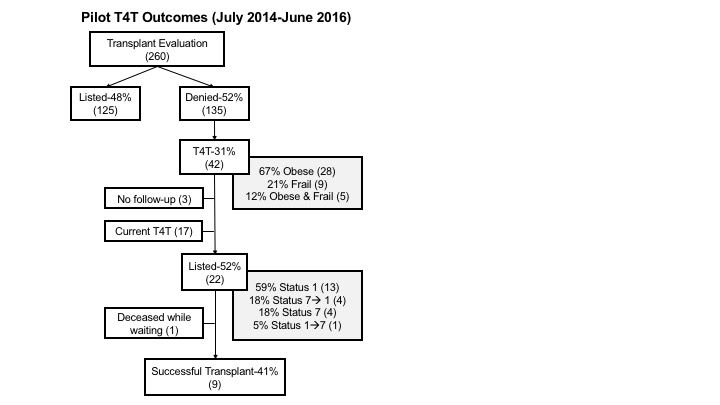Training for Transplant: Frailty Assessment and Optimization in Kidney Transplant Candidates.
Surgery, Scott &
White Medical Center, Temple, TX
Meeting: 2017 American Transplant Congress
Abstract number: 320
Keywords: Obesity, Patient education, Risk factors, Screening
Session Information
Session Name: Concurrent Session: Disparities in Organ Transplantation
Session Type: Concurrent Session
Date: Monday, May 1, 2017
Session Time: 4:30pm-6:00pm
 Presentation Time: 5:06pm-5:18pm
Presentation Time: 5:06pm-5:18pm
Location: E353C
Purpose: To design and implement a frailty assessment and optimization program addressing potential modifiable risk factors that would ordinarily disqualify patients from kidney and/or pancreas transplant candidacy.
Methods: Our Training for Transplant (T4T) program incorporates a comprehensive frailty assessment into initial evaluation for kidney and/or pancreas transplant referrals which includes the Hopkins Frailty Assessment, a Frailty Deficit Index, BMI, and waist-hip ratio measurement. Potential recipients outside our transplant criteria by BMI and/or frailty are offered referral to our multidisciplinary T4T clinic. Patients then follow-up at 3 to 6 month intervals with repeat measurements, and are seen by a transplant surgeon, dietitian and wait-list coordinator. Activity and dietary logs are reviewed; current challenges to candidacy along with goal setting and dietary, social and exercise counseling are provided. T4T participation continues, contingent on documented progress or steady state, until transplant or deemed “not a candidate”. We retrospectively reviewed our pilot T4T experience (July 2014-June 2016) including evaluation, T4T participation and successful listing and transplant of enrolled patients.
Results: 260 patients completed an initial kidney transplant evaluation (Fig 1). 135 patients were deemed outside of listing criteria. 31% of these patients were referred to the T4T clinic. All of these patients were obese or frail and 12% were both. 6 of 9 patients with Hopkins score to >3 improved to normal scores; 1 worsened. eight fluctuated for all patients, however worsening Hopkins score was not observed with weight change. 52% of these T4T patients went on to be listed and 41% were transplanted. There was 100% short term graft and patient survival for both groups.
Conclusions: A multidisciplinary T4T program addressing frailty and obesity can facilitate kidney waitlist candidacy and successful transplant with good patient and graft survival. Our pilot experience suggests that BMI and frailty are modifiable risk factors in ESRD patients. Further work is warranted to investigate the role of patient self-selection and provider intervention.
CITATION INFORMATION: Mrdutt M, Doherty D, Tanner S, Lappin J. Training for Transplant: Frailty Assessment and Optimization in Kidney Transplant Candidates. Am J Transplant. 2017;17 (suppl 3).
To cite this abstract in AMA style:
Mrdutt M, Doherty D, Tanner S, Lappin J. Training for Transplant: Frailty Assessment and Optimization in Kidney Transplant Candidates. [abstract]. Am J Transplant. 2017; 17 (suppl 3). https://atcmeetingabstracts.com/abstract/training-for-transplant-frailty-assessment-and-optimization-in-kidney-transplant-candidates/. Accessed January 28, 2026.« Back to 2017 American Transplant Congress
